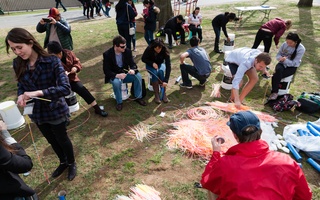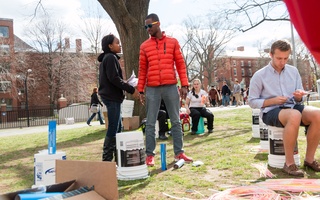With more than 10,000 glowsticks lying at his feet, Mohammed A. Toure ’16, the co-founder of Harvard College Students Against Malaria, was attempting to break a world record in the Science Center Plaza.
The day, April 25, marked World Malaria Day, an official public health campaign by the World Health Organization that aims to raise awareness and understanding as well as to mobilize support for action for the disease. The day prior, Students Against Malaria organized a panel featuring malaria experts—School of Public Health professors Dyann F. Wirth and Marcia C. Castro and Dr. Stephen L. Hoffman, CEO of Sanaria, a company seeking to develop a malaria vaccine—to discuss perspectives on malaria eradication and innovation to policy.
Armed with a megaphone, Toure called out to passersby to join in the effort to create the world’s longest chain of glowsticks, thereby “shedding light” on malaria, which caused 198 million cases and 584,000 deaths in 2013, according to WHO.
{shortcode-50afb5f7b2575e324d54b197d53a3e7edde287b3}
Toure’s efforts to engage those walking past received mixed responses. While some passersby eagerly joined in, others needed a little more coaxing, as Toure offered free Pinocchio's pizza accompanied with an educational flyer about malaria. Phrases like, “I’m running to something else, sorry,” were frequently used.
The event, called the Harvard One Campaign in recognition that “every minute a child dies of malaria,” highlighted the challenge Students Against Malaria faces in attracting the attention and engaging the efforts of an often pre-occupied and not always informed student body. But with support from the Defeating Malaria initiative, a University cross-school effort in partnership with the United Nations Special Envoy’s office that stemmed from a January 2011 Harvard leadership forum, members of SAM remain unfazed in accomplishing its mission of increasing student body awareness.
FRAGMENTED EFFORTS
Born in Guinea and having immigrated to the U.S. in 2007, Toure said he grew up witnessing those around him become infected with malaria. He matriculated to Harvard motivated to make a difference on campus through a focus on global health issues.
“Having been exposed to health disparities and issues like malaria and having a mom who was a nurse [and] treating people who were suffering from these problems, I thought that could be a space I could really have an impact,” Toure said.
Although many global health organizations exist on campus, such as the Harvard Undergraduate Global Health Forum, Team HBV at Harvard, and Refresh Bolivia, Toure said he increasingly felt that a student organization specifically dedicated to malaria could ameliorate what he considered the “fragmented” nature of previous efforts to raise awareness about malaria on campus.
“You don’t just want people coming, doing some work, and then that stops. Then another group comes and does something,” Toure said. He added that an organization like SAM would “somehow consolidate that process that would be established on campus, to actually carry out that goal of raising that awareness to the maximum.”
According to its website, the Office of Student Life will recognize a new student organization if it demonstrates “non-duplication of the mission of previously recognized organizations and avoids clear similarity with another already-recognized student organization,” among other criteria. Toure said he found it relatively easy to argue for SAM’s place on campus, pointing to the “precedent” of other clubs, such as the Harvard Cancer Society, that were dedicated to specific health issues. SAM achieved official OSL recognition last fall.
{shortcode-75f20599bf992fc2082dc418296fe533852ddd97}
Harvard Undergraduate Global Health Forum co-president D.J. Brooks ’17 said that “it would be a lot to focus on every global health issue there is” for his specific group. The Harvard Undergraduate Global Health Forum has already worked with SAM on an event and plans to continue to do so, according to Brooks.
However, he did note that the addition of another global health-focused club on campus requires increased communication between them, an issue that particularly arose last fall when many groups organized similar Ebola-centered events.
Read more in News
Harvard Reaches Agreement With Weston Over Contaminated PropertyRecommended Articles
-
No HeadlineThe annual regatta of the Yale Yacht Club will be held on June 1. It is expected that about twenty
-
Gene Map May Help Eradicate MalariaHarvard researchers have created a genetic map that could serve as an “early warning system” for detecting drug resistance in
-
Mapping Drug ResistanceHow would you feel if a child in the United States died every 30 seconds from a completely curable disease?
-
 In Attempt To Break World Record, Students Host Malaria Awareness Event
In Attempt To Break World Record, Students Host Malaria Awareness Event -
 Harvard Today: April 27, 2015
Harvard Today: April 27, 2015













